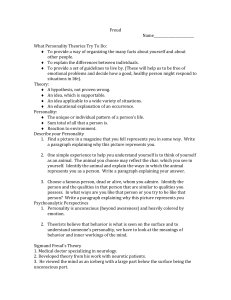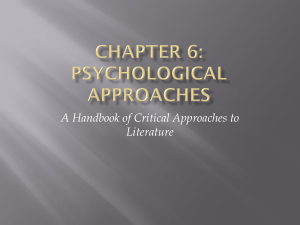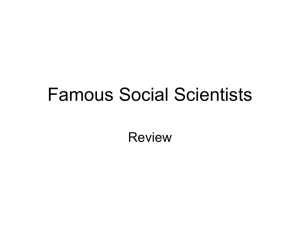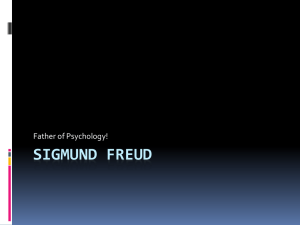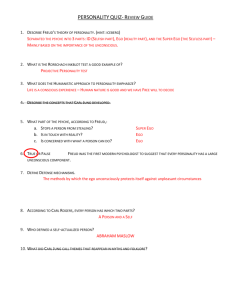Freud`s Psychodynamic Theory
advertisement
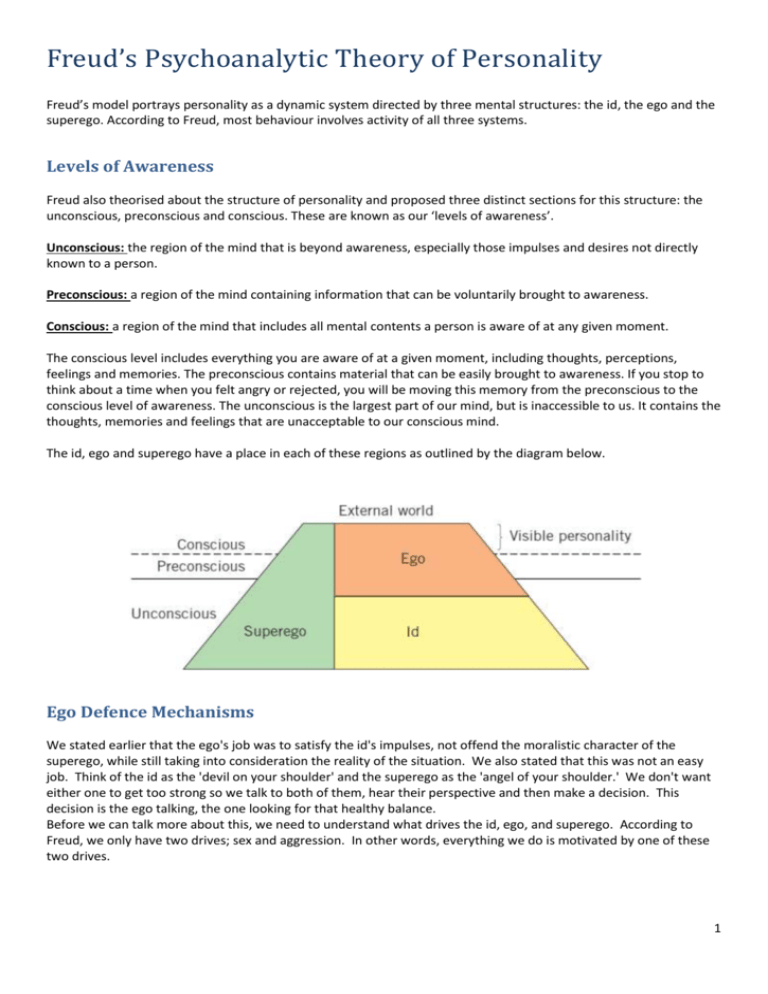
Freud’s Psychoanalytic Theory of Personality Freud’s model portrays personality as a dynamic system directed by three mental structures: the id, the ego and the superego. According to Freud, most behaviour involves activity of all three systems. Levels of Awareness Freud also theorised about the structure of personality and proposed three distinct sections for this structure: the unconscious, preconscious and conscious. These are known as our ‘levels of awareness’. Unconscious: the region of the mind that is beyond awareness, especially those impulses and desires not directly known to a person. Preconscious: a region of the mind containing information that can be voluntarily brought to awareness. Conscious: a region of the mind that includes all mental contents a person is aware of at any given moment. The conscious level includes everything you are aware of at a given moment, including thoughts, perceptions, feelings and memories. The preconscious contains material that can be easily brought to awareness. If you stop to think about a time when you felt angry or rejected, you will be moving this memory from the preconscious to the conscious level of awareness. The unconscious is the largest part of our mind, but is inaccessible to us. It contains the thoughts, memories and feelings that are unacceptable to our conscious mind. The id, ego and superego have a place in each of these regions as outlined by the diagram below. Ego Defence Mechanisms We stated earlier that the ego's job was to satisfy the id's impulses, not offend the moralistic character of the superego, while still taking into consideration the reality of the situation. We also stated that this was not an easy job. Think of the id as the 'devil on your shoulder' and the superego as the 'angel of your shoulder.' We don't want either one to get too strong so we talk to both of them, hear their perspective and then make a decision. This decision is the ego talking, the one looking for that healthy balance. Before we can talk more about this, we need to understand what drives the id, ego, and superego. According to Freud, we only have two drives; sex and aggression. In other words, everything we do is motivated by one of these two drives. 1 Sex, also called Eros or the Life force, represents our drive to live, prosper, and produce offspring. Aggression, also called Thanatos or our Death force, represents our need to stay alive and stave off threats to our existence, our power, and our prosperity. Now the ego has a difficult time satisfying both the id and the superego, but it doesn't have to do so without help. The ego has some tools it can use in its job as the mediator, tools that help defend the ego. These are called ‘Defence Mechanisms’. When the ego has a difficult time making both the id and the superego happy, it will employ one or more of these defences: DEFENCE DESCRIPTION EXAMPLE denial arguing against an anxiety provoking stimuli by stating it doesn't exist denying that your physician's diagnosis of cancer is correct and seeking a second opinion displacement taking out impulses on a less threatening target slamming a door instead of hitting as person, yelling at your spouse after an argument with your boss intellectualization avoiding unacceptable emotions by focusing on the intellectual aspects focusing on the details of a funeral as opposed to the sadness and grief projection placing unacceptable impulses in yourself onto someone else when losing an argument, you state "You're just Stupid;" homophobia rationalization supplying a logical or rational reason as opposed to the real reason stating that you were fired because you didn't kiss up to the boss, when the real reason was your poor performance reaction formation taking the opposite belief because the true belief causes anxiety having a bias against a particular race or culture and then embracing that race or culture to the extreme regression returning to a previous stage of development sitting in a corner and crying after hearing bad news; throwing a temper tantrum when you don't get your way repression pulling into the unconscious forgetting sexual abuse from your childhood due to the trauma and anxiety sublimation acting out unacceptable impulses in a socially acceptable way sublimating your aggressive impulses toward a career as a boxer; becoming a surgeon because of your desire to cut; lifting weights to release 'pent up' energy suppression pushing into the unconscious trying to forget something that causes you anxiety Ego defences are not necessarily unhealthy as you can see by the examples above. In fact, the lack of these defences, or the inability to use them effectively, can often lead to problems in life. However, we sometimes employ the defences at the wrong time or overuse them, which can be equally destructive. 2 Personality development – the psychosexual stages Freud suggested that the core of personality formed before age six in a series of psychosexual stages. Children progress through these stages, in order, with specific emphasis placed on different body parts/areas. Each area then serves as the main source of pleasure, frustration and self-expression. Freud believed that many adult personality traits can be traced to fixations in one or more of the stages. A fixation is an unresolved conflict or emotional ‘hangup’ caused by overindulgence or by frustration. STAGE 1: THE ORAL STAGE (BIRTH TO 2 YEARS OLD) During the first year of life, most of an infant’s pleasure comes from stimulation of the mouth. Freud proposed that if a child is overfed or frustrated, oral traits may be created. Adult expressions of oral needs include chewing gum, biting nails, smoking, kissing, overeating and alcoholism. Fixation early in the oral stage produces an oral-dependent personality. Oral-dependent people are gullible and passive and need lots of attention. Frustrations later in the oral stage may cause aggression, often in the form of biting. Fixations here create cynical, oral-aggressive adults who exploit others. They also like to argue and are good at sarcasm. STAGE 2: T HE ANAL STAGE (2 TO 3 YEARS OLD ) In this stage the child’s attention and source of pleasure shifts to the process of elimination. When parents attempt toilet training, the child can gain approval or express rebellion or aggression by ‘holding on’ or by ‘letting go’. Therefore, harsh or lenient toilet training can cause an anal fixation that ma lock such responses into personality. Freud described the anal-retentive (holding-on) personality as obstinate, stingy, orderly and compulsively clean. The anal-expulsive (letting-go) personality is disorderly, destructive, cruel or messy. STAGE 3: THE PHALLIC STAGE (3 TO 6 YEARS OLD) The genital organs are the focus of attention and the primary source of pleasure. At this time, increased sexual interest causes the child to be physically attracted to the parent of the opposite sex. In males this attraction leads to an Oedipus conflict, causing boys to feel a rivalry with their fathers for the affection of their mothers. Freud believed that the male child feels threatened by the father. To ease his anxieties, the boy must identify with the father. Their rivalry ends when the boy seeks to become more like his father. As he does, he begins to accept the father’s values and forms a conscience. This is known as the Electra conflict in girls. Adult traits of the phallic personality are vanity, exhibitionism, sensitive pride and narcissism. A fixation at this stage could result in sexual deviancies (both overindulgence and avoidance) and weak or confused sexual identity. STAGE 4: LATENCY (6 TO 12 YEARS OLD ) According to Freud there is a period of latency from the age of 6 years to puberty. Latency is not actually a stage. Rather, it is a quiet time during which psychosexual development is dormant. Freud believed that psychosexual development is ‘on hold’ at this time. STAGE 5: THE GENITAL STAGE (12 TO ADULTHOOD ) At puberty, an upswing in sexual energies activates all the unresolved conflicts of earlier years. This upsurge, according to Freud, is the reason why adolescence can be filled with emotion and turmoil. The genital stage begins at puberty. It is marked, during adolescence, by a growing capacity for responsible social-sexual relationships. The genital stage ends with a mature capacity for love and the realisation of full adult sexuality. Evaluation of Freud’s Theory Strengths It pioneered the idea that the first years of life help shape adult personality It identified feeding, toilet training and early sexual experiences as critical events in personality formation Freud was among the first to propose that development proceeds through a series of stages Weaknesses Freud’s portrayal of the primary years as unimportant in personality development is hard to believe His idea of a stern father being important in personality development has been challenged Freud overemphasised sexuality in personality development Freud’s theory cannot be verified scientifically 3
